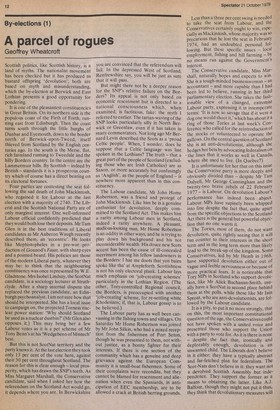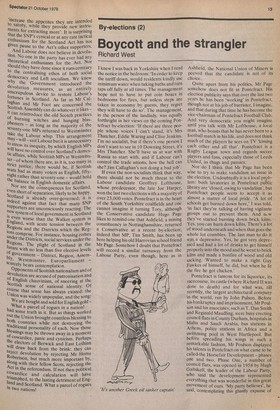By-elections (1)
A parcel of rogues
Geoffrey Wheatcroft
Scottish politics, like Scottish history, is a land of myths. The nationalist movement has been checked but it has produced as bastard offspring 'devolution'; both are based on myth and misunderstanding, which the by-election at Berwick and East Lothian presents a good opportunity for pondering.
It is one of the pleasantest constituencies in Great Britain. On its northern side is the populous coast of the Firth of Forth, running east from Edinburgh. Then the coast turns south through the little burghs of Dunbar and Eyemouth, down to the border north of Berwick-upon-Tweed, itself thieved from Scotland by the English centuries ago. In the south is the Merse, flat, rich farmland running to Tweedale and the hilly Borders country. In the centre are the Lammermuir hills. By Scottish — indeed by British — standards it is a prosperous country which of course has a direct bearing on its electoral fortunes.
Four parties are contesting the seat following the sad death of John Mackintosh, who regained it for Labour at the last election with a majority of 2740. The Liberal and the Scottish National Party are of only marginal interest. One well-informed Labour official confidently predicted that they would both lose their deposits. Mr Tam Glen is in the best traditions of Liberal candidates as Mr Auberon Waugh recently described them, an 'eccentric'. He looks like Mephistopheles in a pre-war production of Gounod's Faust, with sharp eyes and a pointed beard. His policies are those of the modern Liberal party, whatever they may be: to think that the neighbouring constituency was once represented by W.E. Gladstone. Mrs Isobel Lindsay, the ScotNat candidate, is a sociology lecturer at Strathclyde. After a sharp internal dispute she replaced the previous candidate, an Edinburgh psychoanalyst. I am not sure how that should be interpreted. She has a local issue to campaign on, the projected Torness nuclear power station: 'Why should Scotland be used as a nuclear dustbin?' (Mr Glen also opposes it.) This may bring her a few Labour votes as it is a pet scheme of Mr Tony Benn's at his 'Wedgebenn of Mintech' best.
But this is not ScotNat territory and the party knows it. At the last election they took only 13 per cent of the vote here, against their 30 per cent throughout Scotland. The reason for this is clear enough — local prosperity, which has drawn the SNP's teeth. As Miss Margaret Marshall, the Conservative candidate, said when I asked her how the referendum on the Scotland Act would go, it depends where you are. In Berwickshire you are convinced that the referendum will fail. In the depressed West of Scotland, Renfrewshire say, you will be just as sure that it will pass.
But might there not be a deeper reason for the SNP's relative failure on the Bor ders? Its appeal is not only based on economic resentment but is directed to a national consciousness which, when examined, is factitious, fake: the myth I referred to earlier. The tartan-waving of the SNP looks particularly silly in North Berwick or Greenlaw, even if it has taken in many commentators. Not long ago Mr Bernard Levin described the Scots as a 'proud Celtic people'. When, I wonder, does he suppose that a Celtic language was last spoken in the Lothians? The truth — that a great part of the people of Scotland (excluding those who are Irish Catholics) are as Saxon, or more accurately but confusingly as 'Anglish', as the people of England — is nowhere more apparent than in this constituency.
The Labour candidate, Mr John Home Robertson, was a friend and protege of John Mackintosh. Like him he is a genuine enthusiast for devolution, deeply committed to the Scotland Act. This makes him a rarity among Labour men in Scotland, indeed a rarity anywhere. A pleasant, studious-looking man, Mr Home Robertson is an oddity in other ways, and he is trying to play down his background and his not inconsiderable wealth. His douce new Scots accent has been the cause of ill-concealed merriment among his fellow landowners in the Borders: I hae me doots that yon bairn spoke like tha' at Ampleforth. Scottishness is not his only electoral plank. Labour lays much emphasis on lob-creating schemes' particularly in the Lothian Region. (The other, Tory-controlled Regional council, the Borders, is preoccupied with another `job-creating' scheme, for re-settling white Rhodesians; if, that is, Labour gossip is to be believed.) The Labour party has as well been canvassing in the fishing towns and villages. On Saturday Mr Home Robertson was joined by Mr John Silkin, who had a mixed reception from the fishermen of Port Seton, though he was presented to them, not without justice, as a bonny fighter for their interests. If there is one section of the community which has a genuine and deep grievance against the European Community it is small-boat fishermen. Some of their complaints were recondite, but they cannot be blamed for resentment and alienation when even the Spaniards, in anticipation of EEC membership, are to be allowed a crack at British herring grounds. Less than a three per cent swing is needed to take the seat from Labour, and the Conservatives certainly ought to win, especially as Mackintosh, whose majority was so precarious that he lost the seat in February 1974, had an undoubted personal following. But these specific issues — local employment, fishing and hill farming — by no means run against the Government's interest.
The Conservative candidate, Miss Marshall, naturally hopes and expects to win. She is a tough-minded businesswoman — an accountant 7 and more capable than I had been led to believe, running in her third parliamentary election. She takes the fashionable view of a changed, extremist Labour party, expressing it in intemperate terms: 'It is now so savage that if it were a dog one would shoot it,' which has about it a ring of those Tories at last week's Conference who called for the reintroduction of the stocks or volunteered to operate the gallows. On the central question of Scotland she is an anti-devolutionist, although she hedges her bets by advocating federalism on • the lines that it works so well in Canada, where she used to live. (In Quebec?) It is unfortunate for her that on this issue the Conservative party is more deeply and obviously divided than — despite Mr Tarn Dalyell, Mr George Cunningham and the twenty-two brave rebels of 22 February 1977 — is Labour. On devolution Labour's performance has indeed been abject. Labour MPs have supinely been whipped into line despite the fact that, quite apart from the specific objections to the Scotland Act there is the general but powerful objection that no one wants it.
The Tories, most of them, do not want devolution, quite rightly seeing that it will run counter to their interests in the short term and in the long term more than likely lead to the break-up of the kingdom. Some Conservatives, led by Mr Heath in 1968, have supported devolution either out of vague and feeble nervousness or because of more practical fears. It is noticeable that Tory MPs in Scotland who support devolution, like Mr Alick Buchanan-Smith, usually have a ScotNat in second place behind them at the polls, while those like Mr fain Sproat, who are anti-devolutionists, are followed by the Labour candidate.
It is a pity, to put it no more strongly, that on this, the most important constitutional question of the age, the Conservatives could not have spoken with a united voice and presented those who support the Union with a party to vote for. As it is there is none — despite the fact that, ironically and deplorably enough, devolution is an unwanted child. The Liberals don't believe in it either: they have a typically abstract and far-fetched plan for federalism. The Scot-Nats don't believe in it: they want not a devolved Scottish Assembly but independence. They support the former as a means to obtaining the latter. Like A.J. Balfour, though they might not put it thus, they think that devolutionary measures will 'increase the appetites they are intended to satisfy, while they provide new instruments for extracting more'. It is surprising that the SNP's cynical or at any rate tactical enthusiasm for the Scotland Act has not given pause to the Act's other supporters. . And Labour does not believe in devolution. No one in the party. has ever had any theoretical enthusiasm for the Act. Nor Should they have done since it runs contrary to the centralising ethos of both social democracy and Left socialism. We know why the Government introducedthe devolution measures, as an entirely unscrupulous device to restore Labour's fortunes in Scotland. As far as Mr Callaghan and Mr Foot are concerned the Scottish Assembly can do whatever it likes— it can reintroduce the old Scotch practices of burning witches and hanging blasphemers — as long as the majority of the seventy-one MPs returned to Westminster take the Labour whip. This arrangement may suit Labour but it is unnecessary to stress its inequity, by which English MPs Will have no control over Scotland's domestic affairs, while Scottish MPs at Westminster.— of whom there are, as it is, too many. in strict justice; there would be, if Scottish seats had as many. voters as English, fiftyeight rather than seventy-one — would hold the balance in English domestic affairs. Nor are the ainsequences for Scotland, even short of separation, likely to be haPPY: Scotland is already over-governed; it is indeed against that fact that many SNP supporters are unconsciously reacting. The n. ew system of local government in Scotland is even worse than the Walker system in England, with acute tension between the Regions and the Districts which the Regions comprise. For instance, housing comes under the Districts, social services under the Regions. The plight of Scotland in the future with no less than five elective levels of government — District, Region, AssemblY, Westminster, Europarliament — scarcely bears contemplation. Opponents of Scottish nationalism and of devolution are accused of patronisation and of English chauvinism, of sneering at the Scottish sense of national identity. Of course that sense has always existed: the Union was widely unpopular, and the song: We are bought and sold for English gold — What a parcel of rogues in a nation! had some truth in it. But as things worked out the Union brought countless blessing to both countries while not destroying the traditional personality of each. Now those blessings may be thrown away in a moment of cowardice, panic and cynicism. Perha.ps the electors of Berwick and East Lothian Will draw back from the brink: they can reject devolution by rejecting Mr Home Robertson, but much more important by, along with their fellow Scots, rejecting the Act in the referendum. If not then political cowardice and calculation will have triumphed, to the lasting detriment of England and Scotland. What a parcel of rogues in two nations!







































 Previous page
Previous page